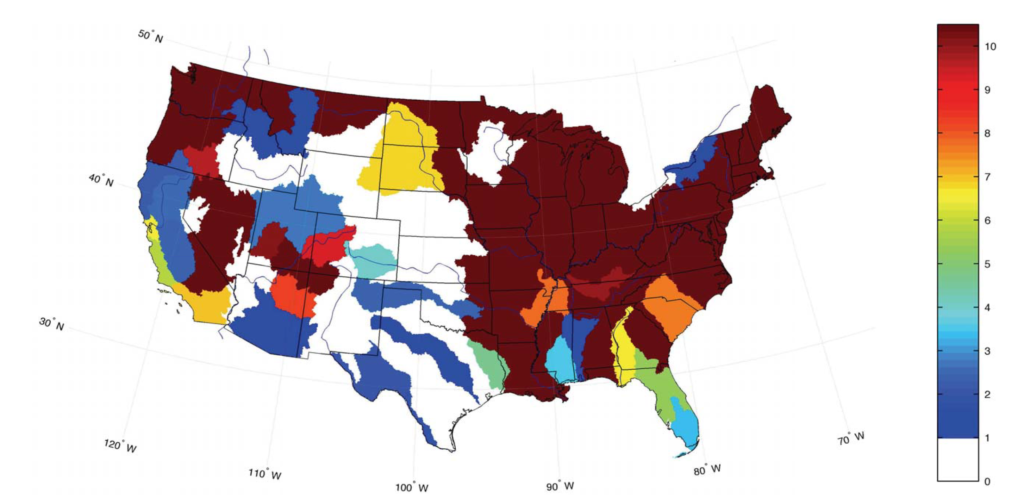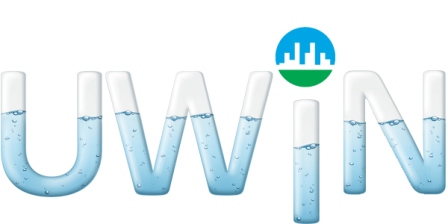Project A1-1: Quantifying vulnerability, resiliency, and adaptability of U.S. urban water systems to climatic and socio-economic variability
Mazdak Arabi, PhD – Colorado State University
Thomas C. Brown, PhD – USDA Forest Service
Hadi Heidari, PhD – Colorado State University
Water scarcity, water supply vulnerability, and water supply resiliency and adaptability are dynamic, multidimensional, and scale-dependent. The interactions between water systems and social, economic, and environmental systems occur at multiple spatial and temporal scales; therefore assessment of impacts, tradeoffs, and benefits must include feedbacks across all spatiotemporal scales, and incorporate all multiple-way interactions.

Relative importance of changes in vulnerability resulting from changes in supply with respect to those resulting from changes in demand, from the current period to 2060 projected by the CGCM model under the A1B scenario.
We will explore the impacts of urbanization on water scarcity, supply vulnerability and resiliency, answering the following questions:
- How does urbanization lead to increased/decreased vulnerability?
- How does urbanization lead to increased/decreased resiliency or capacity for adaptation?
- How do changes in vulnerability or resiliency depend on the location in a city or the analysis scale?
- How do the answers to the above questions vary by region, or depend on the rate of urbanization?
We will enhance the approach of Foti et al. (2014) to characterize distributions of water yield, water supply, and water demand in terms of spatially and temporally variable and mutually interacting probability distribution functions that will be used to assess water scarcity, water supply vulnerability, and water supply resiliency and capacity for adaptation. Water yield will be determined by coupling an ensemble of downscaled climatic projections from CMIP5 global climate models to a land surface eco-hydrologic model accounting for both surface and ground water processes (e.g., the Variable Infiltration Capacity model – VIC model), which will itself be enhanced to allow for climatically dependent and eco-hydrological optimal vegetation responses (e.g., Quebbeman and Ramirez, 2016).
The fully integrated model will be implemented for the entire contiguous US at spatial scales ranging from 10 by 10 km to continental scales, and at temporal scales ranging from daily to monthly to annual over the 21st century. Water supply will be determined using a detailed water allocation model (e.g., WEAP, MODSIM).
Mazdak Arabi, PhD – Principal Investigator
Borland Professor of Water Resources
Civil and Environmental Engineering
Colorado State University
Voice: (970) 491-4639
Email: mazdak.arabi@colostate.edu
Dr. Mazdak Arabi is the Borland Endowment Professor of Water Resources in the Civil and Environmental Engineering Department at CSU. He serves as the Director of CSU’s One Water Solutions Institute. His research, educational, and engagement activities are primarily focused on the development of decision support systems for sustainable management of water resources. Dr. Arabi has developed novel system identification and optimization approaches to facilitate development of solutions for reliable and resilient regional water systems. He is the principal inventor of the environmental Resources Assessment and Management System (eRAMS), a cloud-computing technology for integration of location-based information with simulation models of water, food, and energy systems. The eRAMS platform currently supports more than 200 analytics and decision tools that have been developed in collaboration with other research institutions as well as federal, state and local government agencies. Dr. Arabi also serves as the Director of several major research programs, including the National Science Foundation’s Urban Water Innovation Network, the Environmental Protection Agency’s Center for Comprehensive, optimal and Effective Abatement of Nutrients (CLEAN Center), and the Water Sustainability & Climate Center.
 Thomas C. Brown, PhD – Co-Investigator
Thomas C. Brown, PhD – Co-Investigator
USDA Forest Service
Economist
Voice: (970) 498-2562
Email: tcbrown@fs.fed.us
RESEARCH INTERESTS Assessment of risk of water quality impairment in the over 15,000 fifth-level watersheds of the contiguous 48 states; estimates future water demand in the coterminous US, including specification of the effect of climate change on water demand; vulnerability of future US water supply to shortage, based on a comparison of supply and demand in light of climate change; the effect of climate change on wildfire extent and sediment yield in the Southern Rockies Ecosystem; and public perception of the relative importance of mitigation versus adaptation in responding to expected climate change.
Hadi Heidar, PhD – Postdoctoral Research Associate
Colorado State University
Civil and Environmental Engineering
Email: Hadi.Heidari@colostate.edu
Journal Papers
Heidari, H.; Warziniack, T.; Brown, T.C.; Arabi, M. (2021). Impacts of Climate Change on Hydroclimatic Conditions of U.S. National Forests and Grasslands. Forests, 12, 139. https://doi.org/10.3390/f12020139
Heidari, H., Arabi, M., Ghanbari, M., Warziniack, T. (2020). A Probabilistic Approach for Characterization of Sub-Annual Socioeconomic Drought Intensity-Duration-Frequency (IDF) Relationships in a Changing Environment, Water, 12(6), 1522. https://doi.org/10.3390/w12061522
Heidari, H., Arabi, M., Warziniack, T., Kao, S.C. (2020). Assessing Shifts in Regional Hydroclimatic Conditions of U.S River Basins in Response to Climate Change, Earth’s Future, 8 (10), e2020EF001657. https://doi.org/10.1029/2020EF001657
Warziniack, T., Brown, T. C. (2019). The importance of municipal and agricultural demands in future water shortages in the United States, Environmental Research Letters, 14(8), 084036. https://doi.org/10.1088/1748-9326/ab2b76
Updated: June 2021
Software
Heidari, H., Arabi, M., Warziniack, T., Hydroclimatic Assessment Tool, https://hcat.erams.com/docs/
Theses/Dissertations
Heidari, Hadi (2021). Vulnerability of U.S. River Basins to Water Shortage Over the 21st Century, PhD Dissertation, Civil and Environmental Engineering, Colorado State University, Fort Collins, Colorado. Web: https://hdl.handle.net/10217/232577

